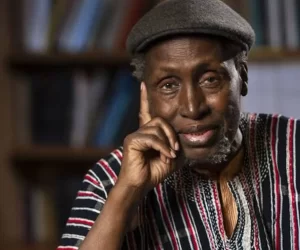Kenyan-born veteran author and literature giant Ngũgĩ wa Thiong’o dies at the age of 87.
Ngũgĩ wa Thiong’o’s Rise To World Recognition
Born James Thiong’o Ngũgĩ in 1938 during British rule, the writer grew up in Limuru amidst the Mau Mau uprising. His family’s struggles under colonial oppression – including his deaf brother’s tragic shooting – deeply influenced his worldview. After studying at Uganda’s Makerere University, his debut novel Weep Not, Child (1964) made history as East Africa’s first major English-language novel.
ALSO READ: Presley Chweneyagae’s Family Reveals Cause Of Death Amid Foul Play Rumours

1977 marked Ngũgĩ’s dramatic transformation. He abandoned his Christian name and English writing after Petals of Blood critiqued Kenya’s post-independence elite. His Kikuyu-language play I Will Marry When I Want led to imprisonment without trial, where he famously drafted Devil on the Cross on toilet paper.
Ngũgĩ wa Thiong’o Death Threats And Exile
Following death threats in 1982, Ngũgĩ spent 22 years in exile, teaching at Yale, NYU, and UC Irvine. His 2002 homecoming turned tragic when attackers assaulted him and raped his wife – an event he called politically motivated. Throughout, he championed African language literature through works like Decolonising the Mind, even critiquing mentor Chinua Achebe for writing in English.
ALSO READ: Prominet News Reader Joseph Madhimba Dies In Namibia After Stroke Battle
A Complex Personal Life
Ngũgĩ wa Thiong’o was married twice with nine children (including four published authors), Ngũgĩ’s personal life drew scrutiny after son Mukoma alleged domestic abuse. Despite surviving prostate cancer and heart surgery, his health declined in later years, though his literary output never waned.
Though repeatedly overlooked for the Nobel Prize, Ngũgĩ’s influence reshaped global literature. As Chimamanda Ngozi Adichie noted, he remained a “guiding light” – proving storytelling could be both an artistic triumph and revolutionary act. His passing leaves an indelible mark on African literature and post-colonial thought.
Follow Us on Google News for Immediate Updates
The post African Literature Giant Ngũgĩ wa Thiong’o Dies At 87 appeared first on iHarare News.









